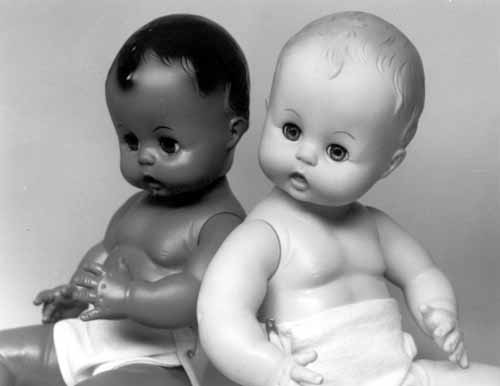 “Mommy is yellow. I not yellow!”
“Mommy is yellow. I not yellow!”
My daughter is not even three, but rubs at my arm and then glances over at her own. It has only been days since I watched the Swedish documentary “Raskortet” about race and racism in Sweden today. I know I shouldn’t be shocked, but I am. Shocked that brown-skinned people have to endure abuse, both physical and psychological in my native country.
In a row of interviews, black – as they call themselves – Swedes share how they got used to be called ugly, have strategies for sudden violence when they are out in town and in a clip three of them simultaneously recalls getting racist comments from a boss and getting pressured into laughing it off. Horrid. The documentary is framed by the Clarks’ Doll experiment that shows children given a choice between a brown and a white doll – and most choosing the “more beautiful” white doll.
I am a Swede who did not think about race much growing up, however due to my life choices (marrying a Ghanaian black man, living in Ghana as a favoured minority, teaching young African students politics, yes, including colonialism, being an Africanist at an African university and re-discovering that I am white) I now get the issue “in my face” every day.
I remember the first time I was told about “white privilege”, this invisible favor I did not ask for but that separates my life from lives of those of color. I have access to many spaces, no questions asked; I am assumed in Ghana to on account on my skin colour be truthful and kind; I can afford luxuries like a research degree and pedicure that most of my fellow Ghanaian women cannot. I have no answers, race still makes me uncomfortable. I have no answers, despite being aware, I enjoy my white privileges. I have no answers, but I have learned to not be afraid of talking about race.
She is not yet three years old and her skin is the most beautiful shade of golden brown. Today she has realised my skin has a different hue and that is true. However, it hurts that others might think less of her just because of that, or even worse, that she will internalize that feeling and think less of herself.
Photo borrowed from Children and the Civil Rights.

10 Comments
Kajsa, if you haven’t, check the swedish Instagram account svartkvinna for more eye opening and chocking revelations about racism in sweden.
I rarely see such honest writing about race, white privilege and identity. I guess having a child makes the issue more personal.
Growing up in Ghana, I’m not sure I will ever fully understand the race problems.
However, I’ve learned one thing about discrimination. People will find a reason to discriminate even if there isn’t one. If we were all same race some other reason would be found. It sad but it’s true. Some people just like to feel superior
Your post gave me goosebumps. I share the same worries yet I still want to stay naïve and wish race and color wouldnt be an issue.
Thanks for sharing.
Thanks, Sarah comments. Will check Svartkvinna out! Being wishful about race does not help, I think. Remember reading your post on this recently, Yngvild. THAT helps!
Efo, could you not write a blog post about race in Ghana, you are right it is such a different issue here…still Ghana has a colonial past which does play in daily (I feel). Would love to read your (expanded) take on the issue.
My experience was rather different than Selma’s. Growing up, I was made fun of for being so white – born and raised in the Caribbean coast, the women who did not enjoy a perfect caramel skin color were mocked. I was one of them, and being the “palest” one in my family, I felt weird… now I live in Germany and, somewhat like you, Kajsa, I unknowingly enjoy the privileges of this whiteness. I am “one of them”, so to speak – I look like them, whiter than some, even. Like Efo Dela says, people will always find a reason to discriminate agains – it is, quite unfortunately, human nature.
“One small step for (wo)man, one giant leap for mankind”. Reading your impressive/beautiful account, Niel Armstrong’s quote when he placed his foot on the moon rings in my head. There’s so much yet to recognize, of people, of environment, of civilization, of how the future relates to the past, here on earth.
Thanks Jerome and Natalya for reading and commenting. I feel just like you, Natalya that race is confusingly changeable over space…
Agreed, Francis. Thanks for reading my blog!